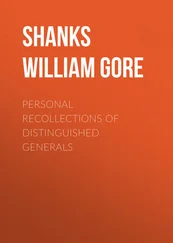Arnim’s political opinions were not without their ambiguities. General Cramer soon came to the conclusion that although Arnim thought he was obliged to defend the National Socialist regime outwardly, his personal opinion about it was different. [141] GRGG 90, 3–9.10.43, TNA WO 208/4363.
The protocols confirm this picture. He made adverse references to the war situation, the National Socialist system [142] See GRGG 89, 4.10.1943, TNA WO 208/4363.
and German war crimes (Document 96). He often conversed freely with Lord Aberfeldy, thus ignoring his maxim that one should always remain silent in the presence of the British. [143] See GRGG 89, 4.10.1943, TNA WO 208/4363. Here he gave Lord Aberfeldy to understand that the Nazi regime had to disappear. Since 1933 they had done much good, but now had gone too far. ‘Then he was asked how, in his opinion, Hitler and his gang should be got rid of, to which he replied, “By killing them”.’ Further proof of his attitude was a letter of 11.1.1944 to OKW chief Keitel refuting a ‘Daily Express’ report that Rudolf Hess had visited Trent Park. He finished the correspondence ‘Filled with the deepest confidence in our leadership… God bless the Führer in his onerous mission!’ BA/MA Pers 6/18. The failure to sign off with ‘Heil Hitler!’ would be seen as ambiguous.
The smouldering conflicts at Trent Park continued into the subsequent months. [144] See for example SRGG 661, 15.12.1943 and GRGG 107, 19–20.12.1943, TNA WO 208/4363.
Crüwell protested at Thoma’s glee over German defeats [145] See SRGG 654, 14.12.1943, TNA WO 208/4167. In his diary Thoma always wrote praising the military successes of the German soldier always adding the rider that they could not change the outcome of the war. See 17.2.1944, 9.4.1944, 8.8.1944. That he was pleased to hear of German defeats is not conveyed by the protocols.
while Thoma took Arnim and Crüwell ever less seriously. They were like the three monkeys: ‘Hear no evil, see no evil, speak no evil’. [146] Thoma to Lord Aberfeldy, beginning August 1943. GRGG 70, TNA WO 208/4363.
On 12 September 1943 Thoma observed to Oberst Rudolf Buhse that he regretted ‘every bomb, every scrap of material and every human life that is still being wasted in this senseless war. The only gain that the war will bring us is the end of ten years of gangster rule’ (Document 14). ‘For that reason I am seen by others as a criminal,’ he said, adding that one ‘should put Adolf Hitler in a padded cell.’ He was clear, of course, that his open rejection of Nazism and his firm belief in the defeat of Germany was not shared by many of his prisoner colleagues who, as a rule, expressed their criticisms in a more moderate manner. Officers like Crüwell and Meixner were firmly convinced that Germany would win the war if it succeeded in fighting off the invasion. (Paul Meixner, diary, 31 March and 18 April 1944)
‘One can only wonder,’ Thoma wrote in his diary on 17 February 1944, that
the majority still expect a miracle and feel slighted whenever one offers a sober and unfavourable judgement of the situation. They take it as a personal insult and feel as if struck a blow on the head. What type of blow to the head will it be when the war ends? The lack of civilian courage, which is rarer than bravery, is responsible for the concern shown by anti-Nazis. I laugh about it and give everybody my opinion about the bitter end. My opinion is completely opposite to that of Goebbels who every week is more stupid and insolent about it in his articles in Das Reich : people do not seem to notice how stupid he thinks we all are. [147] On 23.10.1943 Thoma remarked that although one had access to everything in newspapers and radio, there were always those who remained ‘unshakeable optimists due to their fears or stupidity. A survey of the military, and above all economic situation, is impossible for them. They keep hoping – and they call it a sober assessment of the situation – as if there actually were any hope!’ Thoma Diary, BA/MA N2/3.

Inmates of Trent Park, November 1943: (standing, left to right) Reimann, Neuffer, Krause, Köhncke, Wolters: (seated, left to right) von Broich, von Sponeck, von Liebenstein, Bassenge
Despite all differences of opinion the Trent Park community remained intact in some respects. At Christmas 1943 all prisoners sat together for an excellent dinner with plum pudding and red wine before re-uniting in their small groups to spend Christmas Night in silent contemplation. [148] GRGG 109, 19–25.12.1943, TNA WO 208/4363. Not all inmates were happy with the Christmas sermon delivered by a Swedish priest. Hubbuch wrote indignantly in his diary, ‘We should look inside ourselves and acknowledge our guilt! What does he mean by that? We withdrew and our enemies devised the war guilt lie in the First World War.’ Hubbuch Diary, 24.12.1943.
Even on Hitler’s birthday on 20 April 1944 no such scene as feared by Crüwell eventually occurred. He expected that Thoma would not raise his glass to toast the Führer and was anxious to have acting-SGO Bassenge ejected from the officer corps in case he deliberately avoided making any preparations for the special day. The ‘defeatists’ abstained from making trouble, however. A toast to the Führer was proposed – to Crüwell’s disgust in British beer – after which Arnim made a short speech to the generals in the valets’ dining room. [149] GRGG 129, 10–16.4.1944 and GRGG 130, 17–23.4.1944, TNA WO 208/4363.
Crüwell’s situation at Trent Park became intolerable after he failed to unseat Bassenge as acting-SGO and was not approached to nominate the Head Valet, appointed for all kinds of important organisational tasks. Besides his political tussles, Crüwell found captivity in itself an especially heavy burden. In June 1942 he wrote in his diary, a few days after his capture:
I am completely cut off from the great struggle of our Fatherland. For me there was nothing more honourable and fine than to fight and work for our final victory. I always feared that my health would not hold out and now it has turned out completely differently […] My military career with its rich prospects was very abruptly broken off on 29 May 1942. It is very harsh. [150] Crüwell Diary, Vol. 1, 5.6.1942, p. 18f.
On dark days his mood alternated between depression and rage ‘that I am no longer there to fight.’ [151] Crüwell Diary, Vol. 1, 5.6.1942, p. 5.
From summer 1943 he became increasingly nervy and tired. He gave up physical activities and concentrated on learning English. On 10 August 1943 he wrote:
I have lost a lot of weight. In May 1943 I weighed 71 kilos after being 83 kilos in March. I am now conserving my energy, the best way to handle the lack of food. I think of myself as a horse in winter, getting a lot of hay and not much oats and therefore cannot do much work. But one can handle it, the spiritual burden of captivity is more onerous. [152] Crüwell Diary, Vol. 2, 10.8.1943, p. 111. Crüwell is the only prisoner known to have complained about the catering. In the USA he was located in the military hospital at Camp Forrest (Tennessee) from 4.2.1945 to 3.5.1945 for his nerves and general debility. Crüwell Diary, Vol. 4, 11.5.1945, p. 95.
Finally in mid-January 1944 he asked Lord Aberfeldy if it would not be possible to be interned in Sweden on his word of honour. [153] GRGG 114, 16–22.1.1944, TNA WO 208/4363.
When this was rejected he took cold baths and scratched the eczema on his legs in an attempt to obtain repatriation on medical grounds. This was also unsuccessful. [154] GRGG 123, 20–26.2.1944, TNA WO 208/4363.
On 22 February 1944, however, General Hans Cramer, who had severe asthma, and 34 German soldiers from other camps, were repatriated. [155] At first Cramer was not comfortable with the idea of returning home as a defeated general but eventually accepted that it had been for the purpose of political prestige that the troops at Stalingrad and Tunisia had not been extracted. GRGG 98, 1.11.1943; GRGG 106.5, 5–11.12.1943; GRGG 113.9, 15.1.1944; GRGG 123.20, 26.2.1944, TNA WO 208/4363.
Cramer became important since it seemed likely that he would be closely questioned in Germany about the events in North Africa and in captivity. Crüwell then asked him to suggest to Hitler’s Wehrmacht ADC Schmundt that he should be exchanged for General Richard O’Connor who had been captured in North Africa in 1941. Since O’Connor had escaped in September 1943, Crüwell’s idea had no prospect of success from the beginning (SRGG 761, 14.1.1944, TNA, WO 208/5625). Arnim tried to present himself to Cramer in the best possible light as well. Arnim was certainly only the scapegoat for Rommel: ultimately he was merely a desk general who had made a fool of himself in North Africa, according to Cramer. Whether he achieved his stated aim of telling Hitler ‘the Truth’ about Arnim is not known.
Читать дальше
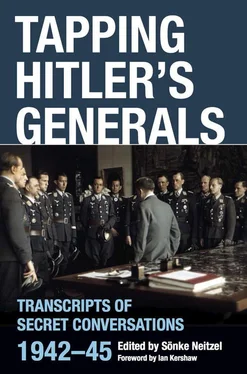


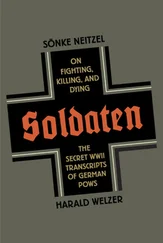
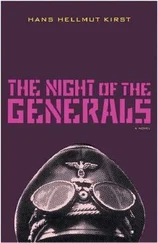


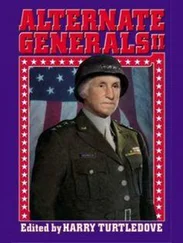

![Traudl Junge - Hitler's Last Secretary - A Firsthand Account of Life with Hitler [aka Until the Final Hour]](/books/416681/traudl-junge-hitler-s-last-secretary-a-firsthand-thumb.webp)



